Guide to LUTs:
Creating Incredible Results with Filmora
What Are LUTs and the Benefits?
LUTs, or lookup tables, are a preset color correction that can be applied to a video clip to adjust its colors and give it a specific look or mood.
LUTs work by mapping one set of colors to another set of colors. When a LUT is applied to a video clip, it adjusts the colors in the clip based on the color mapping defined in the LUT.
By using LUTs, you can ensure a consistent look across multiple clips or an entire project. This is especially useful for projects with many different shots that need to be color graded to match each other.
LUTs can save time and effort in the color grading process, as they allow you to apply a specific look to your footage with just a few clicks. This is particularly helpful when working on tight deadlines.
LUTs are commonly used by professional filmmakers and photographers, so applying them to your footage can help give it a polished and professional look. With Filmora's LUT feature, you can achieve professional-looking results without needing advanced color grading knowledge.


Highlights of Filmora's LUTs
Filmora offers an intuitive and efficient way to apply professional color grading effects to your videos. From built-in LUTs to custom LUT creation tools, let's explore the highlights of Filmora's LUT feature and how it can take your video production to the next level.
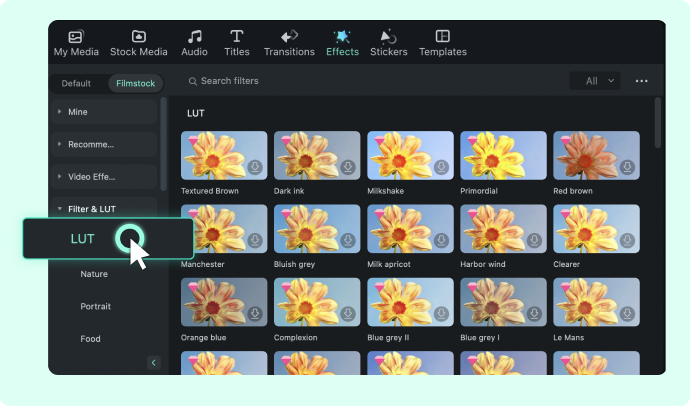
100 new sets of LUT resources are added to enhance the image quality while
covering the areas of fashion, travel, games, sports, movies, and so on.
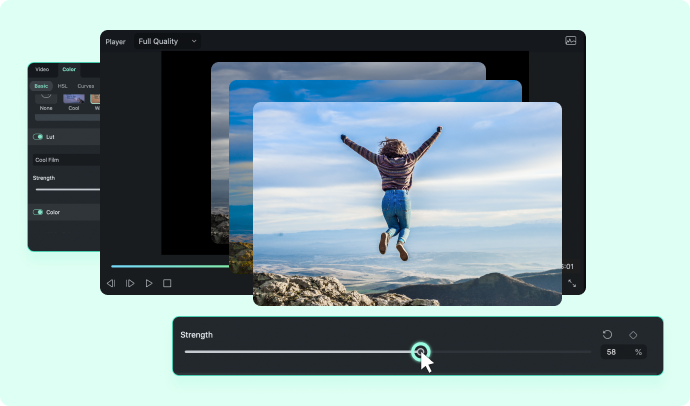
Filmora's LUT feature allows you to adjust the intensity and strength of the LUT,
giving you more control over the final look of your footage.
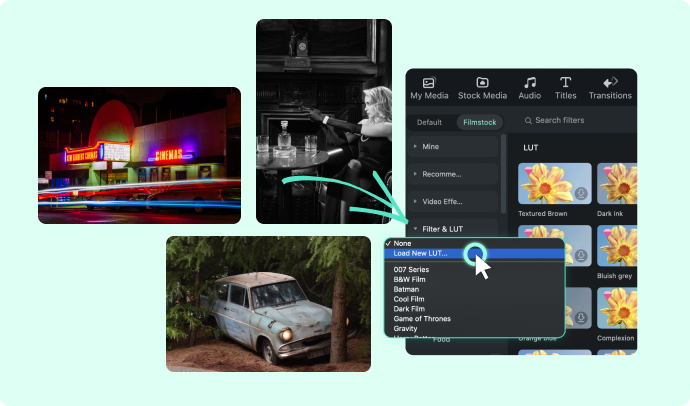
Filmora allows you to upload your own custom LUTs, giving you more flexibility
and creative control over your color grading.
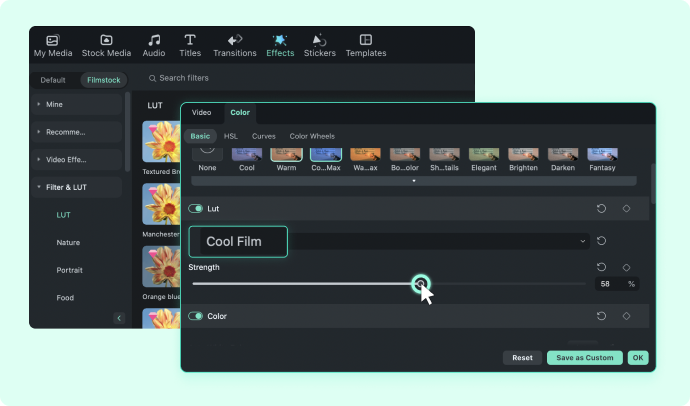
You can import your favorite 3D to better suit your project, increasing creative
control to achieve unique color grading effects.
Unleash Your Creativity With Filmora's LUTs NOW
Steps: How to Apply LUTs in Filmora
To apply LUTs and create cinematic colorful scenes in Filmora, you can follow these steps:
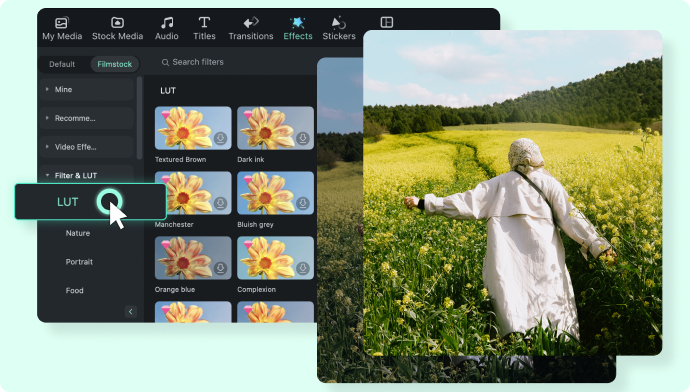
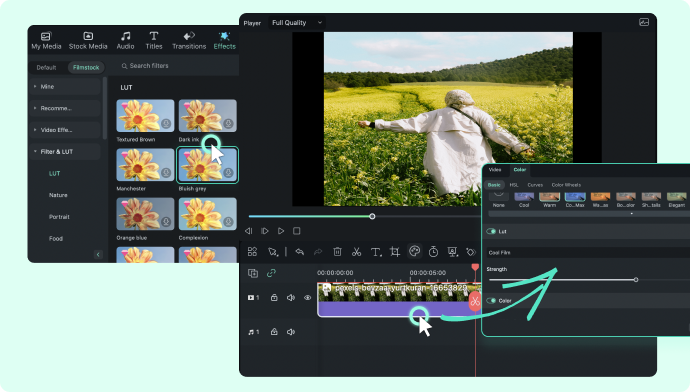
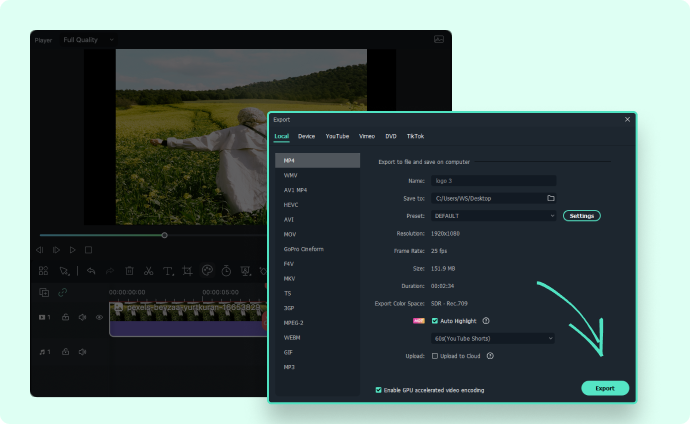
A Deep Dive Into LUTs: Let's Learn More About LUTs
Are you're interested in learning more about LUTs? In this section, we'll explore three common questions you need to know about LUTs, from the
concepts to application sides. So, let's dive in and explore the world of LUT.
LUTs and presets are two common tools used in video editing to adjust the color and tone of footage. While both of these tools serve the same purpose, they work in different ways and offer different levels of control and flexibility.
LUTs are mathematical formulas that map one set of colors to another set of colors, offering precise control over the color grading process.
Presets, on the other hand, are pre-designed sets of adjustments that can be applied with a single click, offering a quick and easy way to achieve a specific look or style.
In video editing, there are two types of LUTs: 1D LUTs and 3D LUTs.
1D LUTs map one color channel to another, such as brightness to brightness or red to red. This type of LUT offers limited control over color grading but can be useful for basic adjustments.
3D LUTs, on the other hand, map all three color channels (red, green, and blue) at the same time, allowing for much more precise adjustments to be made to color and tone. 3D LUTs are often used for more advanced color grading and for creating specific looks or styles.
LUTs can be used in conjunction with other color grading tools to achieve a desired look.
For example, a LUT can be applied as a starting point for color grading, and then additional adjustments can be made using other tools like curves or color wheels. Alternatively, a LUT can be applied at the end of the color grading process to give the footage a final polish or to unify the look of different shots in a project.
By using LUTs in combination with other color grading tools, video editors can achieve a more complex and nuanced color grading result.
Tips: Creating LUTs for Maximum Impact
Creating effective LUTs can be challenging, but by following a few simple tips, video editors can produce high-quality results.
Create and Export Customizable LUTs in Filmora
Cinematic LUTs Pack Recommendation
Frequently Asked Questions
-
What is 3D LUT?
3D LUTs are a color grading tool in Filmora that allow you to apply a specific look to your footage. They can be used to adjust color temperature, contrast, saturation, and other color-related aspects of your video. -
Can I create my own 3D LUTs in Filmora?
Yes, you can create your own 3D LUTs in Filmora. You can use third-party software to create a LUT and then import it into Filmora for use in your project. -
Are Filmora's 3D LUTs compatible with all video formats?
Yes, you can adjust the intensity of a 3D LUT in Filmora using the Opacity or Blend Mode settings. This allows you to fine-tune the effect and create the perfect look for your footage. -
Can LUTs be used for photo editing as well?
Yes, LUTs can be used for photo editing as well. Many photo editing software programs support the use of LUTs, and they can provide a quick and efficient way to apply color grading to multiple photos. -
Is LUT a one-size-fits-all solution?
One potential drawback of using LUTs is that they are a one-size-fits-all solution, and may not always provide the best color grading results for every type of footage. It's important to adjust and fine-tune the LUT settings to achieve the desired result.










